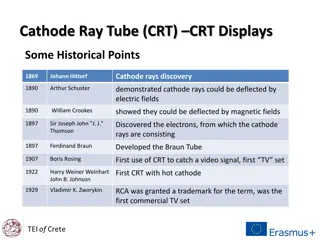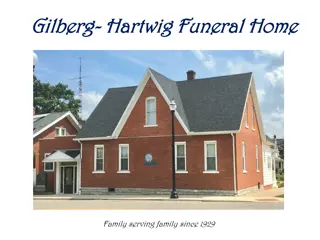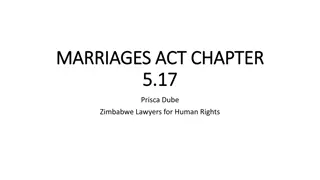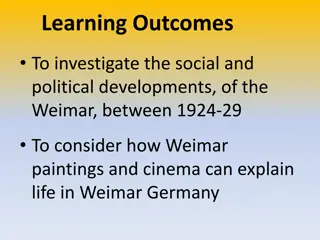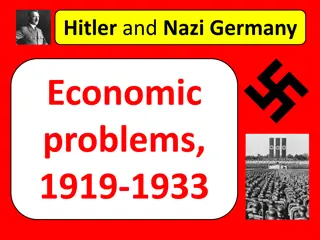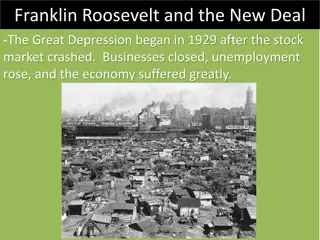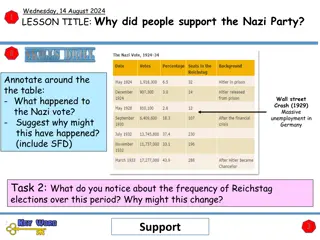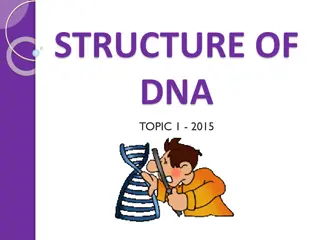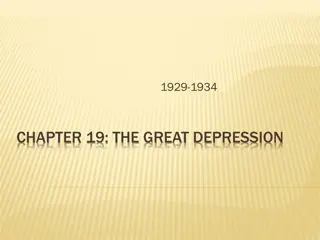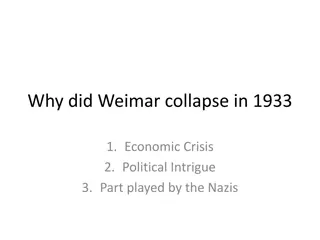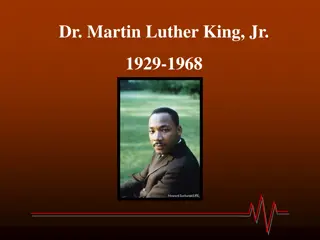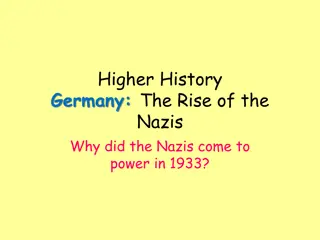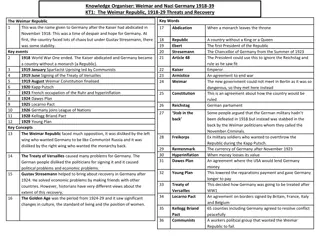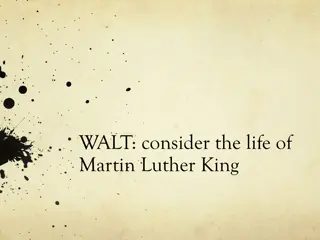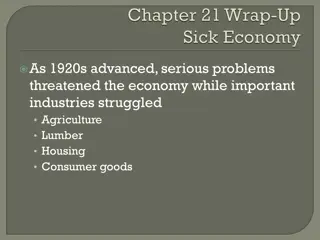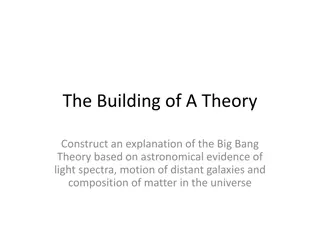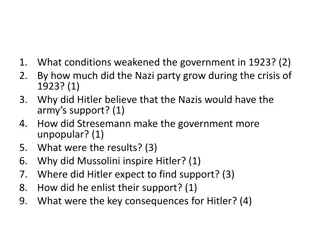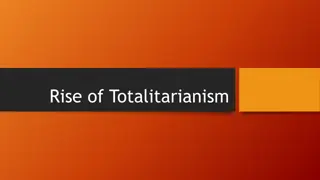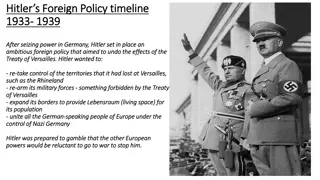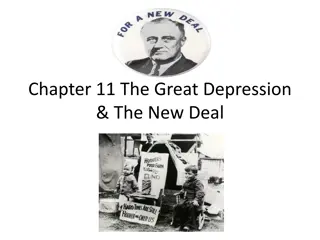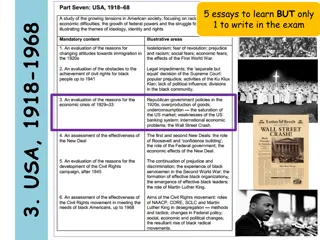Crystal Field Theory in Transition Metal Complexes
Crystal Field Theory (CFT) explains the colors and magnetic properties of transition metal complexes. It focuses on the energy changes in d-orbitals of metal ions caused by surrounding ligands. This theory, developed in 1929, provides insights into the bonding interactions in complex compounds. The
10 views • 44 slides
Exploring Neutron Stars: Discoveries and Characteristics
Neutron stars, initially proposed in 1933, have been the subject of various discoveries and studies. They are characterized by their unique properties such as compactness, high density, rapid spinning, and strong magnetic fields. Neutron stars are predominantly composed of neutrons, with other parti
2 views • 23 slides
Evaluation of Economic Crisis Causes in 1929-1933: Republican Policies and Factors
The economic crisis of 1929-1933 in the USA was influenced by various factors, including Republican government policies favoring laissez-faire capitalism, overproduction of goods, weaknesses in the banking system, international economic issues, and the Wall Street Crash. The prosperity of the 1920s,
0 views • 33 slides
American History Unit 5: Roaring 20s and Great Depression Overview
The Roaring 1920s brought economic prosperity, cultural changes, and political developments. The Great Depression followed, leading to desperation and significant reforms. Explore the impact of key events and personalities such as President Hoover and FDR, the Age of Jazz and Popular Culture, and th
0 views • 12 slides
Evolution of Cathode Ray Tube (CRT) Displays: Historical Milestones
The historical evolution of Cathode Ray Tube (CRT) displays is highlighted, starting from the discovery of cathode rays in 1869 by Johann Hittorf to the development of the first commercial TV set by RCA in 1929. Key milestones include the demonstration of electron deflection by electric and magnetic
0 views • 46 slides
The Cuban Revolution: Batista to Castro
Fulgencio Batista's rise to power in Cuba in 1933 through coups led to army influence in the government. Fidel Castro, born into an upper-class family, organized rebels to overthrow Batista in the Cuban Revolution. After failed attempts and imprisonment, Castro regrouped, defeated Batista's forces i
1 views • 8 slides
Gilberg-Gilberg-Hartwig Funeral Home Service Packages
Offering traditional and semi-traditional funeral service packages with visitation, funeral service, and graveside services included. Packages feature basic funeral director services, facility usage, caskets, outer burial containers, and more. Options for customization available. Prices vary based o
0 views • 27 slides
Marriages Laws in Zimbabwe: A Historical Overview
Marriages in Zimbabwe are governed by various Acts such as the Married Person's Property Act and the Marriage Act, each specifying different rules regarding community of property and contract requirements. Since 1929, marriages are considered out of community of property by default, but parties can
0 views • 24 slides
Understanding Central Place Theory: Key Concepts and Determinants
Central Place Theory (CPT) attempts to explain the spatial arrangement, size, and number of settlements based on central places, zones of influence, and hinterlands. This theory, introduced by Walter Christaller in 1933, outlines the importance of central functions, threshold populations, and factor
0 views • 12 slides
Evolution of Civil Aviation in Turkey: A Historical Overview
Turkish civil aviation has a rich history dating back to the early days of State Airlines Administration in 1933. Over the years, significant milestones such as the founding of Turkish Airlines, privatization efforts, and the emergence of new airline companies have shaped the industry. The Turkish A
0 views • 12 slides
Social and Political Developments in Weimar Germany (1924-1929)
The period between 1924 and 1929 in Weimar Germany witnessed greater political stability with the Social Democrats winning most of the votes, although they did not secure a majority. The election results show a decline in support for extremist groups like the Communists and Nazis. Factors contributi
1 views • 29 slides
Economic Crises Faced by Weimar Republic, 1919-1933
The Weimar Republic encountered significant economic challenges between 1919 and 1933, leading to chaos and a surge in extremist support. Major crises included hyperinflation in 1923 and the devastating global Depression starting in 1929. The Treaty of Versailles imposed reparations on Germany, whic
0 views • 24 slides
Franklin D. Roosevelt and the New Deal During the Great Depression
The Great Depression of 1929 led to high unemployment, closed businesses, and economic suffering. President Hoover's laissez-faire policies failed to address the crisis adequately. In the 1932 election, FDR introduced the New Deal with a focus on Relief, Recovery, and Reform to combat the Depression
2 views • 13 slides
Understanding the Rise of Nazi Party Support
The lesson explores why people supported the Nazi Party in Germany during the early 20th century. It examines factors such as the Wall Street Crash of 1929 and the Weimar government's failures, leading to the rise of Adolf Hitler and the Nazi party. Students analyze different interpretations of the
0 views • 9 slides
Machine Translation: Merits and Demerits
Machine translation, also known as Computer Aided Translation, has revolutionized the way we translate languages. Starting from its simple inception in 1933 to the advanced software programs of the 21st century, machine translation has many advantages such as saving time, cost-effectiveness, and bet
1 views • 6 slides
Victor Petrovich Havin: Life and Works Seminar Overview
Victor Petrovich Havin, a renowned mathematician, was born in 1933 in St. Petersburg. Despite facing challenges during World War II and the Soviet regime, he pursued his passion for mathematics and became a Professor at St. Petersburg University. His career included significant events such as Stalin
0 views • 31 slides
Evolution of DNA Discovery and Understanding Through History
Delve into the captivating history of DNA, from its discovery by Friedrich Miescher in 1869 to the groundbreaking research of Rosalind Franklin in 1953. Follow the journey of scientific pioneers as they unraveled the mysteries of DNA's structure, composition, and role in genetic information transfer
0 views • 33 slides
Saint Bernadette - A Life of Miracles and Devotion
Born in 1844 in Lourdes, France, Saint Bernadette Soubirous had visions of Mary, leading to the discovery of a miraculous spring. Despite initial skepticism, her family and locals witnessed healings and miracles. Declared a saint in 1933, her feast day is observed on April 16th. The Shrine of Lourde
0 views • 12 slides
The Great Depression: Stock Market Crash and Economic Turmoil of 1929-1934
In the early 1930s, the United States faced a severe economic downturn known as the Great Depression. Triggered by the stock market crash of 1929, the nation experienced widespread financial devastation, with millions of people losing their jobs, homes, and savings. The period was marked by economic
0 views • 32 slides
Factors Leading to the Collapse of the Weimar Republic in 1933
Economic crisis, political intrigue, and the rise of the Nazis were key factors in the collapse of the Weimar Republic in 1933. The Wall Street Crash of 1929 exacerbated Germany's economic problems, leading to massive unemployment and social unrest. Political errors and the erosion of democracy furt
0 views • 15 slides
Biography of Dr. Martin Luther King Jr. (1929-1968) - Civil Rights Leader
Dr. Martin Luther King Jr., a prominent civil rights leader, was born in Atlanta in 1929. He made significant contributions through non-violent protests and activism, including leading the Montgomery Bus Boycott and delivering his iconic "I Have a Dream" speech in Washington, D.C. He received the No
0 views • 16 slides
The Great Depression: Causes, Impact, and Government Response
The 1930s marked a period of economic turmoil known as the Great Depression. Misleading prosperity, overspeculation in the stock market, and flawed government policies all contributed to the devastating crash of 1929. As the economy collapsed, unemployment soared, businesses failed, and a sense of d
0 views • 20 slides
The Nazis' Consolidation of Power in Germany, 1933-1939
In the period between 1933 and 1939, the Nazis under Hitler orchestrated a series of strategies to maintain power in Germany. This included the establishment of a totalitarian state, implementation of social controls, extensive propaganda campaigns, foreign policy decisions, and economic measures. H
0 views • 38 slides
Understanding the Rise of the Nazis in 1933: Factors and Impacts
Explore the reasons behind the Nazis' ascent to power in 1933, covering political weaknesses of the Weimar government, economic challenges, the appeal of the Nazis, and the lack of unified opposition. Unpack the historical context of post-World War I Germany and the factors that contributed to Hitle
0 views • 38 slides
Weimar and Nazi Germany: A Historical Overview
Germany's tumultuous period from the Weimar Republic to the rise of Hitler's Nazi Party is marked by economic challenges, political unrest, and social transformation. The Weimar Republic faced threats and sought recovery, while Hitler capitalized on the weaknesses of the system to ascend to power in
0 views • 4 slides
Wagner-Peyser Title III Overview
Wagner-Peyser Title III, established in 1933, aims to create a national employment system to assist job seekers and businesses. It provides job search and placement services, counseling, recruitment services, and labor market information, among other activities. The program also focuses on enhancing
0 views • 9 slides
The Life and Impact of Martin Luther King
Martin Luther King, a prominent figure in the Civil Rights Movement, was born in Atlanta in 1929. He led the Montgomery Bus Boycott, fought against segregation, and delivered the iconic "I Have a Dream" speech. Despite facing violence and discrimination, King advocated for peace, love, and equality.
0 views • 6 slides
Medicine in Germany during the Third Reich (1933-1945): A Historical Study
Explore the dark history of medicine in Germany under the Third Reich, delving into topics such as eugenics, the T4 program, sterilization laws, and medical experiments. Uncover the atrocities committed in the name of healing and delve into the aftermath post-Holocaust, reflecting on the implication
0 views • 67 slides
Events Leading to WWII: Treaty of Versailles to Japan's Invasion of Manchuria
Events like the Treaty of Versailles, Great Inflation in Germany, the October 1929 Depression, and Japan's invasion of Manchuria were significant precursors to World War II. The flawed Treaty of Versailles, economic turmoil in Germany, global depression, and territorial ambitions of Japan all contri
0 views • 25 slides
Understanding the Great Depression and the New Deal in the 1930s
Explore the impact of the Great Depression, Hoover's presidency, causes of the economic downturn, the stock market crash of 1929, the Dust Bowl, Hoover's policies, FDR's New Deal, and its programs to provide relief, recovery, and reform during a difficult period in American history.
0 views • 10 slides
Economic Challenges of the 1920s: From Prosperity to Crisis
In the 1920s, serious economic problems emerged as key industries like agriculture, lumber, housing, and consumer goods faced struggles. The decade saw a decrease in new construction, indicating a weakening economy. Events like the Dust Bowl and the stock market crash of 1929 further exacerbated the
0 views • 12 slides
Presidential Election of 1928: Hoover vs Smith and the Stock Market Boom
Herbert Hoover, successful engineer, won the 1928 presidential election against Alfred E. Smith. Hoover promoted prosperity and optimism, leading to a surge in stock prices. However, the stock market's rapid growth on margin trading eventually collapsed in 1929, causing the Great Depression.
0 views • 14 slides
Exploring the Big Bang Theory: Astronomical Evidence and Scientific Inquiry
Discover the origins of the Big Bang Theory through astronomical evidence such as light spectra and the motion of distant galaxies, tracing back to Edwin Hubble's groundbreaking observations in 1929. Explore how scientists developed hypotheses, collected data, and constructed the theory to understan
0 views • 9 slides
Media and Entertainment in the Jazz Era: 1900-1929
The Jazz Era of 1900-1929 witnessed the development of entertainment through iconic theaters like Orpheum and Keiths, driven by popular figures like Houdini. Women fought for suffrage rights, leading to significant social shifts. The Roaring Twenties brought about a time of wealth, cultural change,
0 views • 9 slides
Evaluating Weimar Germany's Recovery Period 1924-1929
The period of Weimar Germany from 1924 to 1929 witnessed economic, diplomatic, and political recovery under the leadership of Stresemann. The strengths included growth in industries, resolution of the reparations issue, and improved working conditions. However, challenges such as budget deficits, de
0 views • 15 slides
The Rise of Totalitarianism: Impact of the Great Depression and Hitler's Ascension
Explore the causes of the Great Depression, the impact of the Treaty of Versailles on Italy and Germany, and analyze how Adolf Hitler came to power in Germany amidst the economic turmoil. Dive into the rise of Fascism in Europe, including Nazism, Mein Kampf, and Hitler's strategies for economic reco
0 views • 27 slides
Hitler's Ambitious Foreign Policy Timeline: 1933-1939
Hitler's foreign policy from 1933 to 1939 aimed at undoing the Treaty of Versailles by reclaiming lost territories, rearming military forces, expanding borders for Lebensraum, and uniting German-speaking people under Nazi Germany. The Saar region's reunification in 1935 boosted Hitler's plans, while
0 views • 12 slides
Emerging Legal Framework for Maritime Governance
The content discusses the amendments made by the Maritime Area and Foreshore (Amendment) Bill 2013 to the Foreshore Act of 1933, outlining clear processes and procedures for development in marine areas. It further explores the Programmes for Government, guidance documents for ORE projects, and expec
0 views • 8 slides
The Great Depression and the New Deal: A Historical Overview
The content covers key events during the Great Depression and the implementation of the New Deal, including the Stock Market Crash, Hoover's presidency, the Veterans Protest, the Election of 1932, and the impact of the Depression in 1932-1933. It discusses economic challenges, political responses, a
0 views • 24 slides
Understanding the Economic Crisis of 1929-33 in the USA
Explore the factors contributing to the economic crisis in America between 1929-1933, including Republican policies, overproduction, banking system weaknesses, international economic problems, and the Wall Street Crash. The stock market boom of the 1920s, driven by easy credit availability, ultimate
0 views • 13 slides




